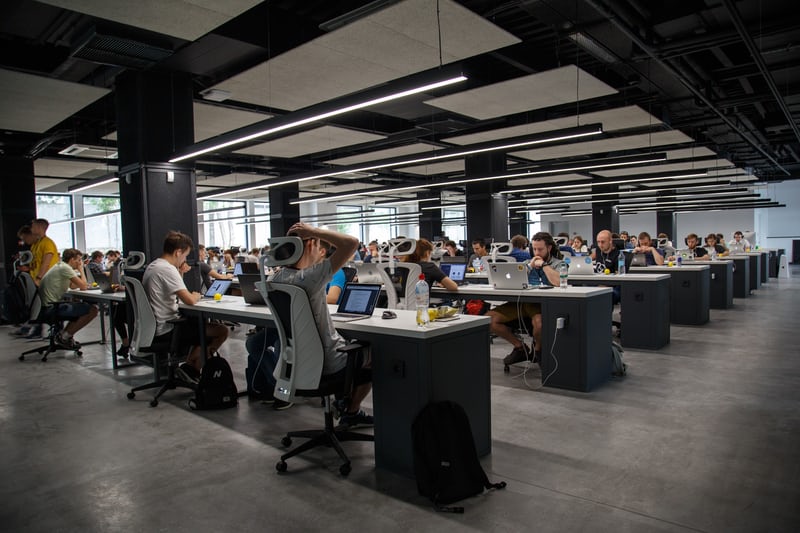Competency-based education (CBE) generally enables all learners to succeed in a learning or training program, especially when it comes to technical subjects such as software engineering. Good software development engineering programs incorporating CBE allow students to develop core technical competencies that match with on-the-job demands for software jobs. The emphasis on competencies as a measurement of learning also enables equity in education and means education providers can offer programs with significant flexibility.
By increasing equity in education, more and more learners can succeed and become software developers. The barriers to a quality education are broken down in competency-based education as students from all backgrounds can participate and succeed. The flexibility of this method of education enables better learning outcomes for non-traditional learners as well as those that learn by doing. Competency-based education encourages learners to develop the core competencies that will make them successful candidates for future careers.
Students Can Learn in Ways that Work Best for Them
Every single person learns in a different unique style that works specifically for them. This is exactly why flexibility in the learning approach is crucial to success for any training program, including software engineering. Some people identify with visual, auditory, or kinesthetic learning. What works for one person may not work for another. Through visual learning, graphics and media are used to communicate information. In auditory learning, sounds and voice are best used to a learner's advantage to convey information. Lastly, in kinesthetic learning, one must actually learn by doing, a very hands-on method. They learn by building problems out in the form of a diagram to better understand the individual components and find a solution. Sticking to traditional models of lectures and knowledge transmission, student who aren't auditory learners are immediately at a disadvantage. Instead, competency-based education provides flexibility for learners to engage with their subject matter in ways that work best for them and how they learn, with a focus on developing a skill or competency rather than passing an exam.
Competency based education is focused on how students learn best and what works best for them. The competencies can be learned through any of the styles of learning described above which makes it all encompassing for a wide variety of learners. The way that they understand the new concepts in a project is up to them, as they know the way that they individually learn best.
All Qwasar programs are competency-based programs, that also use hands-on, project-based learning and role plays to help learners develop technical competencies in software-related fields.
Students Develop Competency At Their Own Rate, Around Their Schedule
In addition to learning in different ways, people also learn at different speeds, which can also be dependent on a learner's previous experiences and jobs. Each student is unique in their own sense, and will grasp certain concepts differently and at different speeds than others. Learning in competency-based programs is not about learning X and Y in amount of time, or a certain format, but instead is about understanding and developing competency with less regard for time. There is no standard timeline for every single person to understand something and having flexibility in this kind of education means it is much better adapted to all learners and thus more inclusive.
Taking time to understand a concept is important to gaining actual competency and full understanding, and this happens often for learners in our programs. For example, some students progress quickly through our introductory track, while others with no previous coding experience take longer but learn a huge amount. Progression over time can all also be dependent on when people work during the week and how much time they have to study.
By adding in a level of flexibility around when students get their work done - essentially when they do their hands-on learning and software projects - programs can accommodate a wider population, including those who work part-time or full-time. Students can also develop strong time management skills. They can dedicate time and increase productivity during time that works for them, rather than being stuck in a 3-hour lecture that may not suit their learning style and schedule. Everyone has different responsibilities in life and these programs enable students to meet them where they are and work around them. This leads to higher completion rates and better success rates. Student outcomes are better when they are given opportunities to learn as they learn best.
A Focus on Software Development Competency Changes Students' Perspective on Learning
Competency-based education for software engineering focuses of helping learners develop competencies in software development: gaining the hard and soft skills required for on-the-job success. Part of the effects of using competency-based learning is that learners start to focus on thinking about and developing their own coding competency rather than focusing on passing an exam. Since competency reflects on-the-job skills, learners set themselves up for learning how to learn on the job and as part of the job, particularly as software engineers are expected to adapt and pick up new tools, programming language, or frameworks on a regular basis. used in a variety of ways to get learners to think differently and be a better learner.
What's particularly useful about competency-based learning for software engineering is that thanks to the method of learning, students gain a new perspective on and ability to troubleshoot problems, particularly coding problems and bugs. They learn to ask the right questions, and to give and receive peer code reviews or feedback. This helps them learn to articulate what they do and don’t know as well as communication skills with giving and receiving quality feedback among peers. Both are very important for future jobs. In software development training with a competency-based program, learners are given the opportunity to demonstrate proficiency and understanding of the core competencies throughout the program.
Competency based education programs for software development place an emphasis on learners' development of their own skills and abilities as well as understanding the core competencies needed to be successful in the 21st century, with ever-changing skills required by employers.

Rooted in Hands-on, Engaging Learning Activities, CBE Drives Skill Development
In order to develop competencies in software engineering and development, CBE training programs need to focus on progressive skill development in key hard skills and soft skills employers are looking for. Good programs are well designed and apply learning science and theories of skill development to deliver a hands-on, engaging curriculum based around learning activities that reflect on-the-job tasks and skills.
At Qwasar, we use a collection of coding exercises, software projects, role play exercises, and peer code reviews to develop software engineer competencies in students. These hands-on activities are the means through which students progress through a technically advanced curriculum to advance to entry-level skills that employers want in software engineers.
Many of the skills employers want in software engineers pertain to software development experience, and are only learned through experiential learning, practice, and repetition. They include, among many other skills:
- decision-making skills with respect to software architecture and programming language in the face of trade-offs
- the ability to translate project descriptions into technical requirements and a code base
- the ability to design and execute software architecture using anticipation, abstraction, and logic
- consistently writing quality, maintanable and readable code
- time management and project planning including debugging, testing, and deployment
It's one thing to know these things exist, but it's another to be a competent engineer able of applying and executing the above skills on a consistent and ongoing basis. To do so requires practice, and thus building numerous software projects.

Developing True Competency Means Learners Are Prepared For Jobs
Through competency-based learning, students are prepared and confident for the job search process. They have performed countless technical interviews and peer code reviews, have developed multiple software projects, and have mastered the core competencies for success in the field of software development. They have gained both the experience and intellect for the interview process and any technical questions that may come up with a hiring manager.
In Qwasar programs, students gain extensive experience with technical interviews, a strong technical portfolio, and software development experience. These students are high-value and high potential candidates for any software development position in any industry. They can easily demonstrate what they have learned in their competency-based program as well as articulate what they are capable of.

Conclusion
Learning software development takes rigor and dedication to be truly successful. In order for someone to learn how to code and be a great developer, they need to understand how they learn best. At its core, competency-based learning is the most beneficial way that every learner can succeed in their journey to become a software engineer with strong job prospects. The tools and techniques incorporated into our programs enable diverse groups of learners to be high-quality and high-value candidates for employers.
The methods used by our learning science enable learners to learn by doing, in an environment that works best for themselves, personally. By taking into account the learner's perspective and incorporating how and when someone learns, we are able to design our program around these core competencies necessary to be successful in software development. This gives every learner the opportunity and ability to become a great developer.


